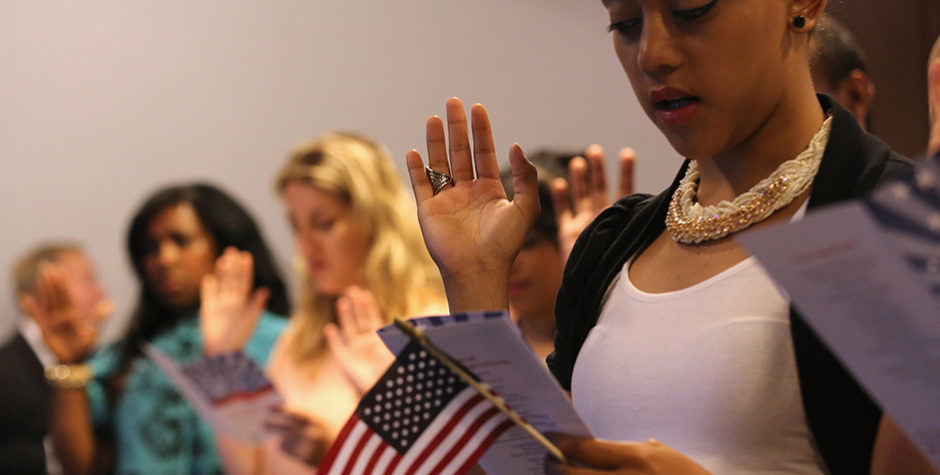First Circuit Court of Appeals Shuts Down Atheist’s Attack on “God” in U.S. Citizenship Oath
Once again, extreme atheists are trying to take God out of another sacred American institution – this time suing to have “so help me God” ripped out of our oath of allegiance for new citizens.
A U.S. Court of Appeals rightly rejected the claim.
Olga Paule Perrier-Bilbo, a self-affirmed atheist who immigrated to the U.S. from France, has applied for citizenship twice, and been accepted both times but refused to complete the process over objections to the phrase “so help me God” in the citizenship oath. Perrier-Bilbo filed a lawsuit demanding that the words “so help me God” be removed from the Naturalization Oath of Allegiance to the United States of America, which every applicant has recited when sworn in as a United States Citizen for over 200 years.
The Naturalization Oath of Allegiance reads as follows:
"I hereby declare, on oath, that I absolutely and entirely renounce and abjure all allegiance and fidelity to any foreign prince, potentate, state, or sovereignty, of whom or which I have heretofore been a subject or citizen; that I will support and defend the Constitution and laws of the United States of America against all enemies, foreign and domestic; that I will bear true faith and allegiance to the same; that I will bear arms on behalf of the United States when required by the law; that I will perform noncombatant service in the Armed Forces of the United States when required by the law; that I will perform work of national importance under civilian direction when required by the law; and that I take this obligation freely, without any mental reservation or purpose of evasion; so help me God."
The Plaintiff argued that including “so help me God” is “asserting that God exists . . . accordingly, the current oath violates the first ten words of the Bill of Rights, and to participate in a ceremony which violates that key portion of the United States Constitution is not supporting or defending the Constitution as the oath demands.”
However it seems there was more at play than her wanting to exercise her own personal beliefs. Perrier-Bilbo was offered TWO alternative accommodations to meet her objection to using the word God. She was given the opportunity to choose a private swearing-in ceremony where the words “so help me God” would be omitted, or to take the oath publicly but when others said the words, she could remain silent in respect of her beliefs. Perrier-Bilbo refused both options.
According to her lawsuit:
By placing a religious statement (to which Plaintiff does not adhere) into the Oath of Naturalization, and the forcing Plaintiff to use an alternative oath (so that she must feel less than a new citizen), Defendants substantially burden Plaintiff in her exercise of religion.”
It appears that, while she doesn’t want to be burdened by the beliefs of others, Perrier-Bilbo’s preferred solution would be to have her own beliefs forced on everyone else.
Including the words “so help me God” does not force a belief or religion on anyone. It is simply a time-honored tradition that has been adhered to as part of our cultural and religious heritage as a nation.
The U.S. Court of Appeals for the First Circuit appeared to agree, as it rejected the atheist suit’s claim that the words “so help me God” violate the First Amendment rights of atheists.
As stated in the court’s opinion:
Although the Due Process Clause may protect her ability to “worship God according to the dictates of [her] own conscience,” . . . the Government has not prevented Perrier-Bilbo form expressing her atheistic religious beliefs. Nor can Perrier-Bilbo claim that the regulation prescribing the oath prohibits her from having a public ceremony during which she does not have to say the phrase “so help me God.”
Rather, the regulations enable her to alter the oath, and the Government has given her alternatives to accommodate her beliefs so that she is comfortable during her ceremony and is able to naturalize.
Perrier-Bilbo’s actual complaint seems to be that the Government will not change the oath for everyone attending the public ceremony so that no one utters the words to which Perrier-Bilbo objects. Perrier-Bilbo certainly does not have a protected liberty interest in that.
We have fought in cases like this before, when atheists have attacked God as part of our national heritage. When they tried to have our national motto, “In God We Trust” removed from our currency, the ACLJ filed a critical amicus brief on behalf of 50 Members of Congress when the suit was first filed, urging the court to dismiss the ludicrous lawsuit, and it did.
The court dismissed the atheists’ suit as well, yet again agreeing with our arguments that “In God We Trust” on our currency “burdened neither the atheists’ free exercise nor free speech clause rights because Plaintiffs were not compelled to do anything.” In other words it doesn’t force anyone to do or believe anything, and it in no way violates the Constitution.
Just as we said then, the First Amendment affords atheists complete freedom to disbelieve, but the phrase “so help me God” does not actually force new citizens to adopt a religion or believe anything.
We applaud this decision by the First Circuit Court of Appeals. The oath doesn’t violate the Constitution or force religious beliefs on anyone. Atheists should not be allowed to either.
However, as we know from our “In God We Trust” cases where the atheists continually appealed the decisions and our legal team had to be ready to act quickly to defend the National Motto, we must be ready to act should these atheists attack the phrase “so help me God” again. And rest assured we will be.
